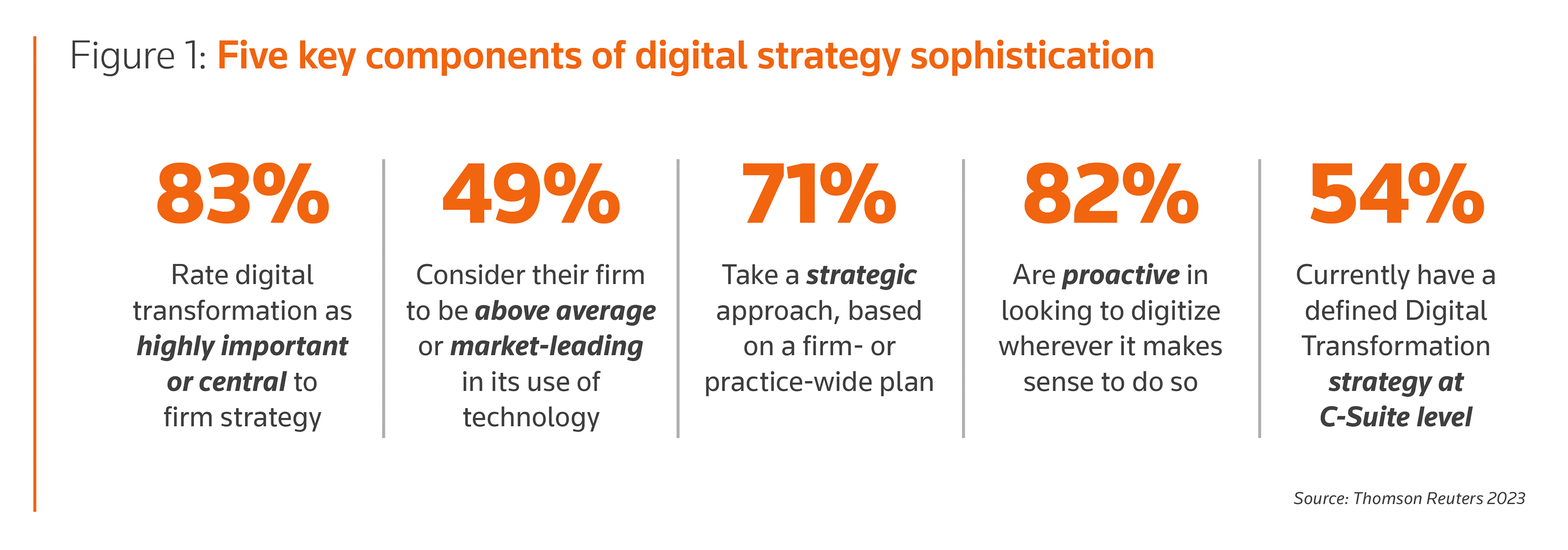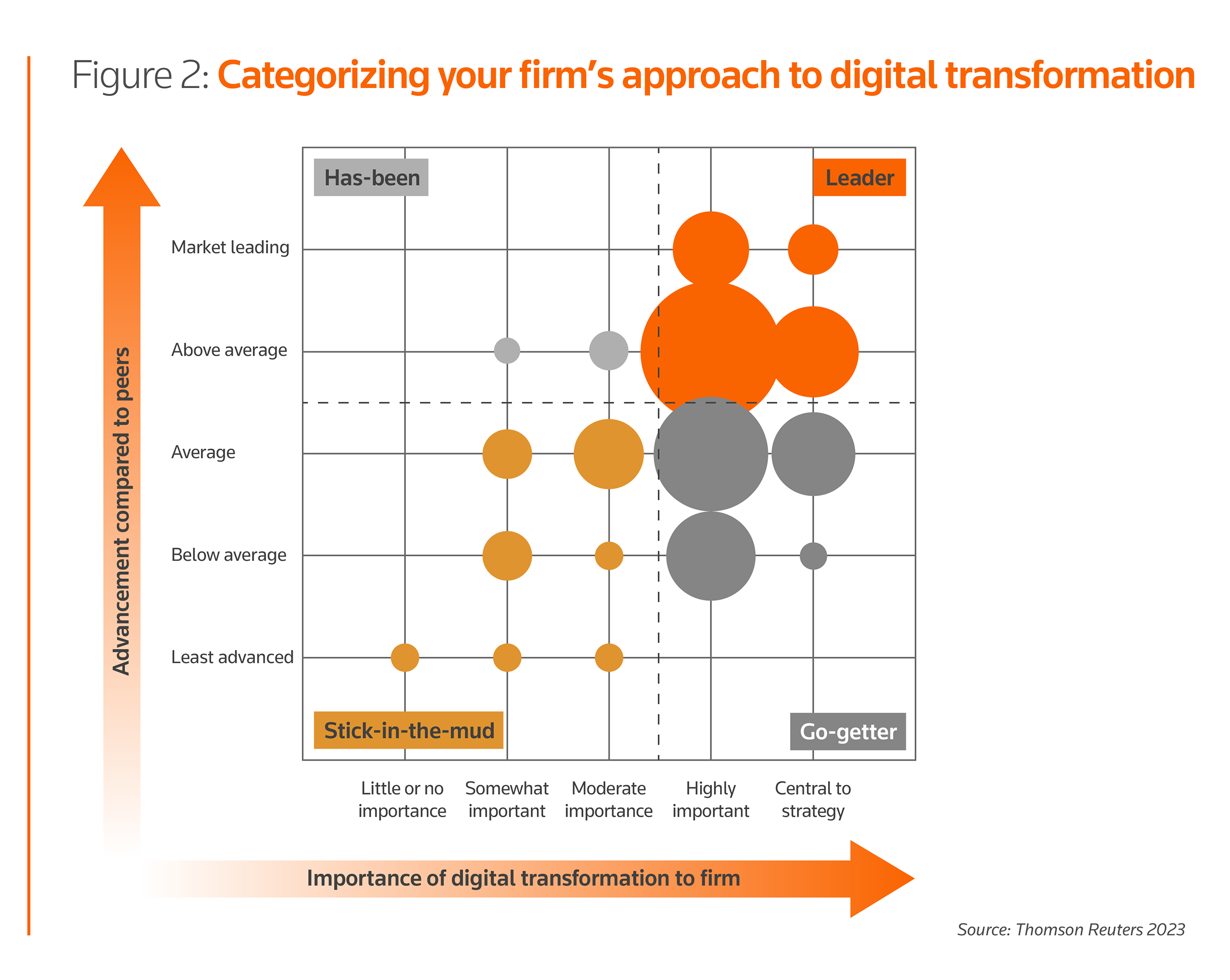A new report from the Thomson Reuters Institute finds that law firms’ level of digital sophistication depends on integration with firm strategy and leadership buy-in
Technology purchases have been a part of law firms’ necessities for as long as there have been telephones and fax machines. It’s only recently, however, that firms have begun to ask the question: How well do our digital initiatives correspond to our overall firm strategy?
According to new research, increasingly more law firms are beginning to coalesce their digital transformation projects into an overarching strategy that has buy-in from the C-suite level. Overall, law firms feel positively about their digital strategies as well, with most firms viewing themselves as strategic and proactive in formulating and executing that plan. However, the devil is in the details, of course — and many firms remain split among first, how to execute these strategies, but then on who should own the strategy and what its ultimate goal should be.

To determine how law firms are approaching the intersection of digital transformation and overall firm strategy, the Thomson Reuters Institute has launched a new Digital Strategy Report. The result of 115 interviews with leaders of law firms across the globe, the report goes beyond the oft-discussed operational elements of digital transformation initiatives to determine the sophistication level of law firms’ digital strategies and categorizing firms based off on their approach to digital efforts. The report also seeks to shed light on how this nascent area of strategy is being developed.
Most firm leaders responding to the survey said they view their firms’ digital transformation approach as above average compared to peers, if not market leading. Similarly, many say those digital transformation efforts are either highly important or central to the firm at large. Firms that placed themselves in both categories qualify as leaders, which comprise 46% of our total sample. However, no digital transformation efforts are perfect — as to be expected when only a slight majority (54%) say they have a strategy that is implemented at the C-suite level. In particular, the survey found that although executive leadership has ownership of digital projects and often has mandatory objectives linked to digital strategy, firm attorneys and clients can sometimes be left out of the process.
However, no digital transformation efforts are perfect — as to be expected when only a slight majority (54%) say they have a strategy that is implemented at the C-suite level. In particular, the survey found that although executive leadership has ownership of digital projects and often has mandatory objectives linked to digital strategy, firm attorneys and clients can sometimes be left out of the process.
The report also highlighted other key findings, including:
-
-
-
- Digital strategy as a concept is in its early stages — Respondents were split roughly in half between those that had an established strategy at the C-suite level and those that did not yet have such a strategy. A large portion of firms are somewhere in the middle of that timeline, either actively developing their strategy or having launched a strategy within the past two years.
- Most firms feel positive about their digital strategy — Although few law firms had an established digital transformation strategy at the C-suite-level for more than three years, most firms believe they’re overall on the right track. Among those with a defined C-suite-level digital strategy, most rated their firm’s digital strategy success at a 7 or above on a 10-point scale.
- Executive directors & tech functions own strategy, while attorneys & clients are left out — Firms are doing well formalizing the strategy creation and implantation process, but even though many respondents said client service was a direct goal of their digital strategy, many firms left clients out of the creation and implementation process entirely. And while many consulted partners, associates, and other attorneys at the creation of a digital strategy, few attorneys maintain a stake in the success of the project through mandatory objectives.
- Engagement is a challenge, but it also produces big wins — Far and away the biggest challenge for firms implementing a digital strategy has not been the technology piece, but rather securing internal buy-in and engagement. And yet, respondents also cited engagement and buy-in as their biggest win after undertaking the digital strategy process, even more than cited other benefits, such as increased efficiency or updated infrastructure.
-
-
The idea of an overarching digital strategy has begun to take hold in many law firms — and the idea may spread both out of greater operational efficiency but also out of necessity. As one law firm leader whose firm recently adopted a digital strategy said: “It’s really to remain competitive. We have to, is the short answer.”
You can download a full copy of the Thomson Reuters Institute’s new “Digital Strategy Report” by filling out the form below:







